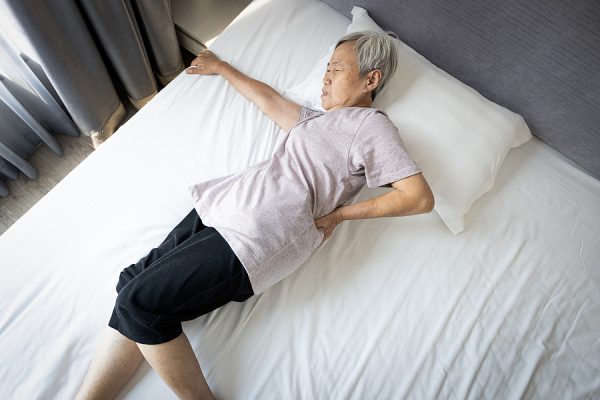By David Blyweiss, M.D., Advanced Natural Wellness
If you’re not getting enough sleep every night it might be by choice, or it might be involuntary. But either way, you probably don’t think of it as a health concern.
That’s a mistake. And it’s not just because a poor night’s sleep leaves you with brain fog that affects your thinking, decision-making and motor skills the next day. Less than optimal sleep can have a huge impact on nearly all aspects of your health:
It makes you gain weight and belly fat. Even in young, healthy and lean people, shortened sleep time is associated with an increase in calorie consumption, weight gain and a significant increase in belly fat.
Not only that, but while you sleep, chemicals and hormones that help control appetite are released. If you’re not sleeping soundly, those chemical messengers and hormones are disrupted, which adds to weight gain.
It contributes to the development of Alzheimer’s. During sleep, events from the day are moved from short-term memory to long-term memory. If sleep is disrupted too soon, it prevents this memory consolidation from occurring. It also interrupts a process that removes neurotoxic waste products that accumulate in your brain during the day.
It increases your chances of cardiovascular disease. Shortened sleep time is linked to higher risk of heart disease. It raises blood pressure and heart rate, narrows blood vessels and promotes salt retention. This increases the risk of heart attack or stroke.
It can lead to diabetes. Reduced sleep time is linked to impaired glucose tolerance, insulin resistance and pancreatic beta-cell function. All of these are associated with a greater chance of developing type 2 diabetes.
It is linked to chronic inflammation. Sleeping less than six hours a night can result in higher levels of three inflammatory markers: Fibrinogen, IL-6 and C-reactive protein. Each of these compounds has been implicated in heart disease, stroke, cancer, Alzheimer’s and other inflammatory diseases.
What’s Keeping you Awake at Night?
There are a lot of reasons you may be involuntarily losing sleep at night.
For aging women, menopause is their number one sleep enemy with night sweats making for disturbed sleep. Probably the best thing a woman can do is to use appropriately prescribed bio-identical hormones to balance things out.
For older men, it’s the prostate. Nobody wants to get up and down all night long just to dribble over the toilet. Thankfully, there are options to treat prostate problems.
Sleep apnea is another biggie for both sexes.
And then there’s acid reflux. What a rude awakening! It can help to use a wedge pillow to elevate the upper part of the body. Or if you have one of those adjustable beds like a Sleep Number, raise the head of the bed by three or four inches.
But one of the biggest reasons people are losing sleep is due to pain.
Different Sleep Positions for Different Aches and Pains
You know the deal. You hit the hay and your bad neck or back starts aching. Your peripheral neuropathy kicks into overdrive. Your arthritis flares up.
In many cases, finding the right sleep position can help avoid pain during sleep.
For example, if you experience back pain that gets worse at night, lying on your side can be more comfortable than lying on your back or stomach. (Sleeping on your back is likely to produce the worst symptoms.)
With peripheral neuropathy, the way you sleep could compress the nerves that control pain in your lower limbs and feet. So in this case, you need to decompress those nerves.
You can do that by putting a pillow under your thighs if you sleep on your back. If you sleep in your side, place the pillow between your thighs. And if you sleep on your stomach, put it under your stomach. Sleeping in a recliner can help, too.
As far as arthritis is concerned, sleep position will depend on your area of concern. For instance, if it’s your knees that ache, a pillow between the knees while lying on your side – or under your knees when sleeping on your back – can add some comfort.
For the neck, it’s going to be more important to keep your neck in a neutral position. That means using a relatively thin pillow if you sleep on your back, or one that has a little more height when sleeping on your side. You should avoid sleeping on your stomach if you have neck pain.
If you have peripheral neuropathy or arthritis in your feet, even the weight of a blanket or sheet can cause painful sensations. It might help to sleep with your feet outside the covers. But if they get cold when uncovered, you can always check out using a blanket lifter. These devices hold the covers above painful feet and lower legs, so it keeps them warm without touching them.
In the meantime, the perfect amount of sleep for people middle-aged and older is about seven hours. Sleeping significantly over or under that amount can result in unwanted health consequences. And don’t think you can make up for lost sleep on the weekends! It just doesn’t work that way.
Sources:
Covasin N, Singh P, McCrady-Spitzer SK, St. Louis EK, Calvin AD, Levine JA, Somers VK. Effects of Experimental Sleep Restriction on Energy Intake, Energy Expenditure, and Visceral Obesity. JACC. 2022; 79 (13): 1254.
Taheri S, Lin L, Austin D, Young T, Mignot E. Short sleep duration is associated with reduced leptin, elevated ghrelin, and increased body mass index. PLoS Med. 2004 Dec;1(3):e62.
Lo JC, Loh KK, Zheng H, Sim SK, Chee MW. Sleep duration and age-related changes in brain structure and cognitive performance. Sleep. 2014 Jul 1;37(7):1171-8.
Spira AP, Gamaldo AA, An Y, Wu MN, Simonsick EM, Bilgel M, Zhou Y, Wong DF, Ferrucci L, Resnick SM. Self-reported sleep and β-amyloid deposition in community-dwelling older adults. JAMA Neurol. 2013 Dec;70(12):1537-43.
Li Y, Sahakian BJ, Kang J, Langley C, Zhang W, Xie C, Xiang S, Li Y, Cheng W, Feng J. The brain structure and genetic mechanisms underlying the nonlinear association between sleep duration, cognition and mental health. Nature Aging. 2022;(2):425-437.
Morris A, Coverson D, Fike L, Ahmed Y, Stoyanova N, Hooper WC, Gibbons G, Bliwise D, Vaccarino V, Din-Dzietham R, Quyyumi A. Abstract 17806: Sleep Quality and Duration are Associated with Higher Levels of Inflammatory Biomarkers: the META-Health Study. Circulation. 2010;122: A17806 .
Nagai M, Hoshide S, Kario K. Sleep duration as a risk factor for cardiovascular disease- a review of the recent literature. Curr Cardiol Rev. 2010;6(1):54-61.
Antza C, Kostopoulos G, Mostafa S, Nirantharakumar K, Tahrani A. The links between sleep duration, obesity and type 2 diabetes mellitus. J Endocrinol. 2021;252(2):125-141.
Nagai M, Hoshide S, Kario K. Sleep duration as a risk factor for cardiovascular disease- a review of the recent literature. Curr Cardiol Rev. 2010;6(1):54-61.
Cary D, Briffa K, McKenna L. Identifying relationships between sleep posture and non-specific spinal symptoms in adults: A scoping review. BMJ Open. 2019;9(6):e027633.
Goldman SM. Nocturnal neuropathic pain in diabetic patients may be caused by spinal stenosis. Diabet Med. 2005 Dec;22(12):1763-5. University of Cambridge. “Seven hours of sleep is optimal in middle and old age, say researchers.” ScienceDaily. April 2022.






